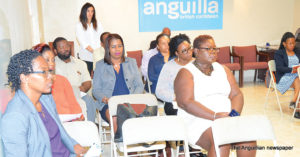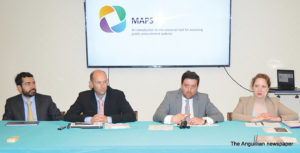 A European team of four officials representing the Methodology for Assessing Procurement Systems (MAPS) was on island this week meeting with government personnel and relevant stakeholders to discuss the standards of procurement policies for public projects. In a workshop at the Anguilla Tourist Board on Tuesday, March 26th, the intricate details of international procurement processes were thoroughly explained.
A European team of four officials representing the Methodology for Assessing Procurement Systems (MAPS) was on island this week meeting with government personnel and relevant stakeholders to discuss the standards of procurement policies for public projects. In a workshop at the Anguilla Tourist Board on Tuesday, March 26th, the intricate details of international procurement processes were thoroughly explained.
According to Chief Procurement Officer in the Ministry of Finance, Ms. Ludiane Laveret-Richardson, the workshop served to validate the MAPS assessment of Anguilla with relevant stakeholders. She explained: “Several sessions would provide an opportunity to present the findings of the MAPS assessment. Discussions will be held with interested stakeholders and those partners that were part of the fact-finding missions….”
The MAPS officials facilitating the workshop included Mr. Nicolas Penagos, Procurement Expert; Mr. Douglas Fraser, Head of Procurement, Caribbean Development Bank; Mr. Paulo Magina, Head of Procurement Unit, OECD; and Ms. Lena Diesing, Analyst, Procurement Unit, OECD (Organization for Economic Co-operation and Development).
In his opening remarks at the workshop, Hon. Minister of Finance, Mr. Victor Banks, welcomed the visiting team of officials and commented: “Procurement is a very critical area of enterprise. Especially in government, systems must be put in place to ensure fairness in terms of awarding contracts and in terms of the procurement of supplies that are necessary for conducting the services that the public needs.”
He then went on to explain the rationale for a transparent procurement process: “Generally, procurement is one of those areas that become more and more complex. It creates some challenges for the community, for when one does not understand policy, it is difficult to deal with the system. As a consequence, from time to time, people may believe that the procurement systems stand in the way of progress. However, good policies on procurement are an important aspect of the developmental process.
“Transparency and fairness are the key factors for contractors and suppliers who would seek to provide services for government and for other agencies. At the same time, politicians can be very impatient and would like to get things done quickly. I do not want to give the impression that because of impatience we don’t need to be transparent. However, we do want to be transparent in an efficient way.
“So, the more education that is shared with the community, and persons who would want to be involved in the award of contracts and the provision of supplies, the easier the job will be for all of us. The Procurement Office in Anguilla gets criticized quite often because people believe that the office creates obstacles for them. But when one learns the system, things can run smoothly.
 “In helping us to learn the system, it is important that we have these experts from the Caribbean Development Bank, from OECD and other agencies, of international note, who will help us to develop a system that is in keeping with the national standards and guidelines of procurement. This is important for any developing country especially now that we, as Government, have had the opportunity recently to award a number of contracts to persons who carry out work and services for the government.”
“In helping us to learn the system, it is important that we have these experts from the Caribbean Development Bank, from OECD and other agencies, of international note, who will help us to develop a system that is in keeping with the national standards and guidelines of procurement. This is important for any developing country especially now that we, as Government, have had the opportunity recently to award a number of contracts to persons who carry out work and services for the government.”
Mr. Banks reiterated that persons who want to avail themselves of contracts with Government, or those who wish to provide services and supplies, need to be educated along the lines of the procurement process.
The team of MAPS experts will be also conducting assessment workshops in Antigua & Barbuda, the British Virgin Islands, Montserrat, and St. Kitts & Nevis.
– Staff Reporter, James R. Harrigan







